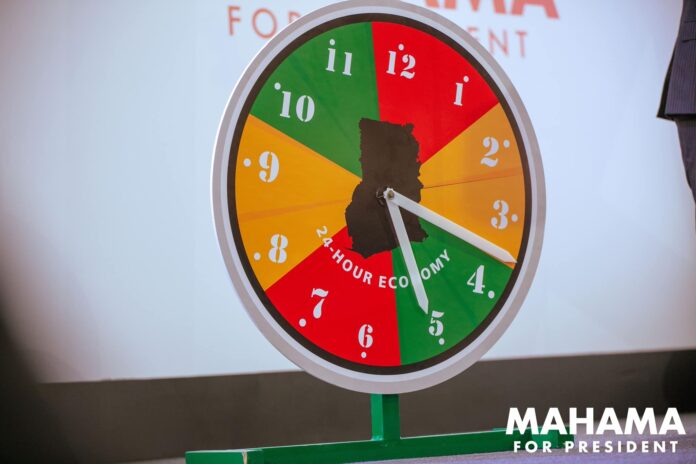President John Mahama has unveiled Ghana’s 24-Hour Economy as a bold model to attract global investors, declaring that the country is open for business around the clock.
Speaking at the opening of the 8th Africa–Singapore Business Forum on August 26, he described the initiative as Ghana’s anchor strategy for productivity, exports, and jobs.
“Our economic strategy is anchored in productivity, exports and jobs. We call it the 24-Hour Economy—for a reason. Ghana is OPEN FOR BUSINESS 24 hours a day,” Mahama told an audience of business leaders, policymakers, and investors.
He explained that Ghana is aligning infrastructure, incentives, and skills so that factories, farms, ports, and service centres can operate round-the-clock shifts safely and competitively.
“At the core of this is the Volta Economic Corridor—our most ambitious integrated development to date,” he said.
The corridor, he noted, rests on four pillars:
-
Grow24: irrigating more than two million hectares for year-round farming.
-
Make24: agro-industrial parks for textiles, pharmaceuticals, and food processing.
-
Show24: tourism and hospitality along one of the world’s great inland lakes.
-
Connect24: transforming Lake Volta into a cost-efficient inland transport spine, reducing logistics costs and linking farms, factories, and markets.
President Mahama said the strategy is further supported by catalytic projects such as the Legon Pharmaceutical Innovation Park, the Kumasi Machinery and Technology Park, the Akosombo-Juapong Garments and Textiles Park, Digital TVET Centres of Excellence, and renewable energy corridors.
“Our Big Push Infrastructure programme will accelerate roads, power, and digital connectivity to crowd in private capital and unlock scale,” he added.
Ghana as a trusted gateway
Positioning Ghana as a magnet for investors, the President stressed that the country offers stability, access to markets, and a reliable investment climate.
“As host of the African Continental Free Trade Area Secretariat, Ghana sits at the heart of the US$3.4 trillion single market. Through ECOWAS, we connect you to more than 400 million consumers in West Africa. We offer political stability, a rules-based environment, a double taxation agreement with Singapore in force since 2019, and a growing base of Singaporean investors—69 companies registered with cumulative investments exceeding US$2 billion,” he said.
Mahama also highlighted Ghana’s reform agenda: “We are pursuing a deliberate national reset: stabilising the macroeconomy, restoring confidence and reforming how we do business. Inflation is easing, the cedi has stabilised, and ratings outlooks are improving. We are simplifying regulations through our Business Regulatory Reforms, and we are reviewing our Investment Promotion Act—including the removal of minimum capital thresholds for foreign investors—to make it easier and faster to partner.”
Africa as the world’s next growth frontier
Turning to the wider continent, President Mahama made a strong case for Africa as the world’s next major investment destination.
“I speak today as an African leader and as President of Ghana. Our message is simple: Africa is investable, and Ghana is your reliable gateway to the continent. The continent is the world’s most dynamic emerging market.
“We are 1.4 billion people today—young, fast-urbanising, digitally connected—and by 2030, Africa’s cities will host more than 700 million consumers.
“The African Continental Free Trade Area is the largest new free trade area in the world by number of countries, creating a $3.4 trillion market and lowering barriers across supply chains.”
He also pointed to Africa’s innovation edge: “Africa holds vast renewable energy potential and is already a global leader in mobile money and fintech adoption. This is a market ready for scaled solutions. Yet this opportunity must be matched with capital at the right price and with the right instruments.”
Financing gaps and partnerships
As the African Union’s Champion on Financial Institutions, Mahama acknowledged the continent’s funding challenges.
“Africa faces an annual financing gap estimated at $1.3 trillion. Infrastructure needs alone run between $181 and $221 billion per year through 2030, while the climate finance gap is about $213 billion annually. We are taking steps to build an African financial system that works for Africa; accelerate the African Monetary Institute as a precursor to the African Central Bank, and link ten major stock exchanges through the African Exchanges Linkage Project to enhance liquidity.”
He called on Singapore to be a key partner, citing its strengths in finance, technology, and logistics.
“Singapore stands at the nexus of global finance, fintech, logistics and green innovation. Your excellence in project preparation, blended finance, risk management, standards and dispute resolution is precisely what African projects need to move from pipeline to bankable to build,” he said.
Testing Ghana’s readiness
Mahama invited investors to engage directly during his state visit.
“On day three of this State Visit, as part of the Africa Forum, we will host a Presidential Business Roundtable. Join us. Bring your teams. Put Ghana’s readiness to the test. We will showcase bankable projects, provide direct access to our regulators, outline incentives for strategic investors and offer a one-stop investor concierge so decisions can be made quickly and confidently.”
He closed with a direct appeal to business leaders:
“Our proposition is straightforward: a stable, reform-minded country, connected to the AfCFTA, designed for scale; a 24-Hour Economy that matches your need for speed, reliability and standards; a pipeline of investable projects in agribusiness, logistics, manufacturing, energy, digital and tourism; a partner that values integrity, predictability and long-term relationships.
“When Singaporean and African firms collaborate, we will create jobs for our youth, diversify global supply chains, and drive growth in sustainability.”
Source: Abubakar Ibrahim



